外研版(2019)>选择性必修 第四册>Unit 4 Everyday economics writing- 精品英语课件(31张)
文档属性
| 名称 | 外研版(2019)>选择性必修 第四册>Unit 4 Everyday economics writing- 精品英语课件(31张) | 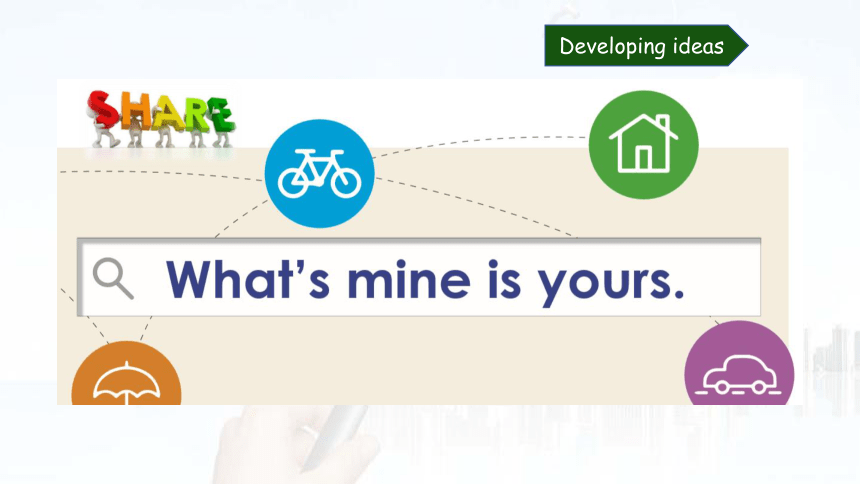 | |
| 格式 | pptx | ||
| 文件大小 | 4.9MB | ||
| 资源类型 | 教案 | ||
| 版本资源 | 外研版(2019) | ||
| 科目 | 英语 | ||
| 更新时间 | 2023-05-23 18:26:57 | ||
图片预览

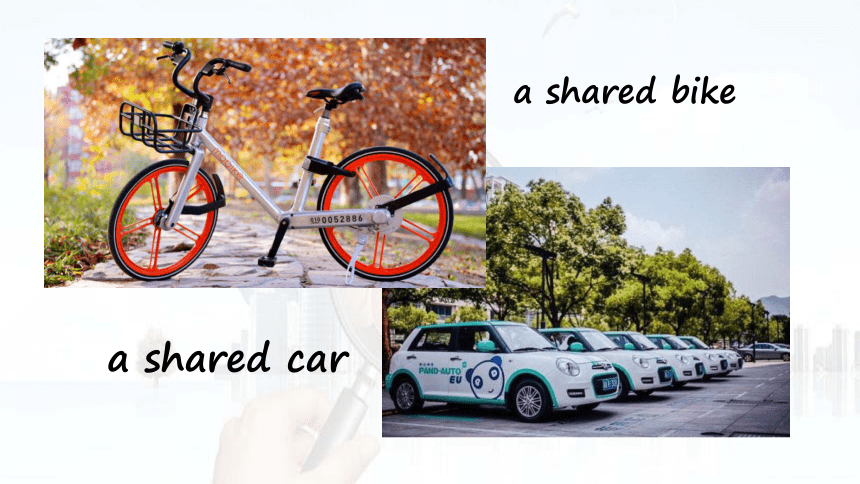
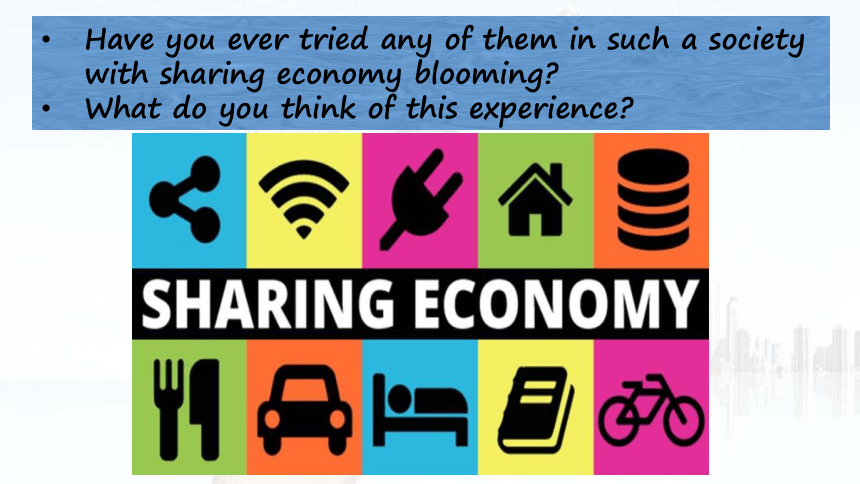
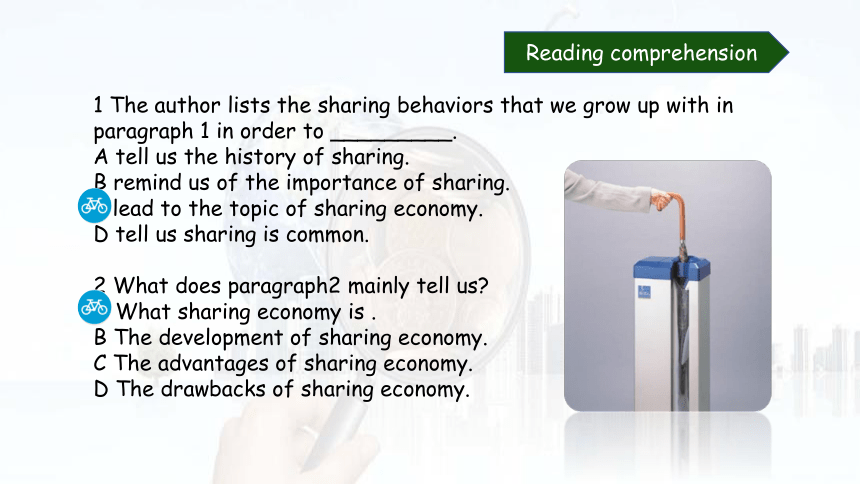
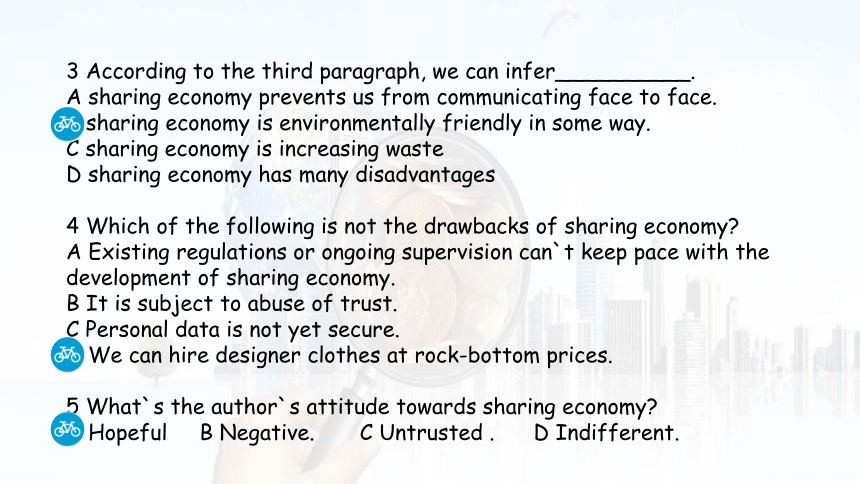
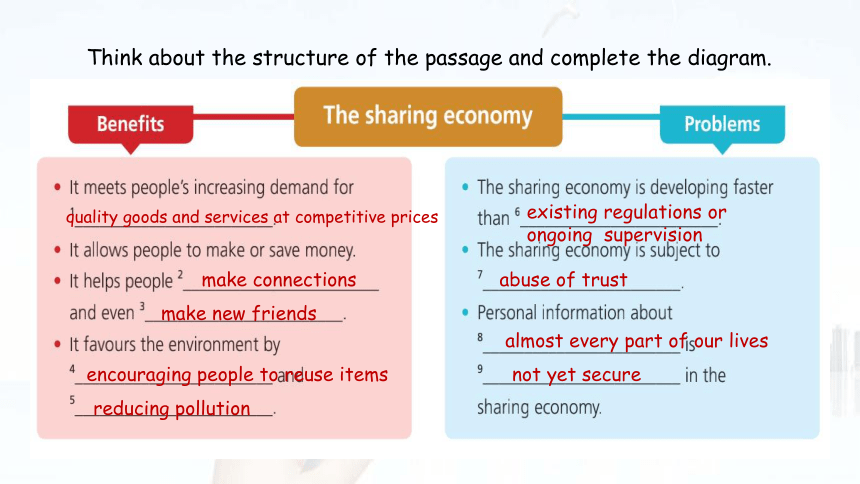
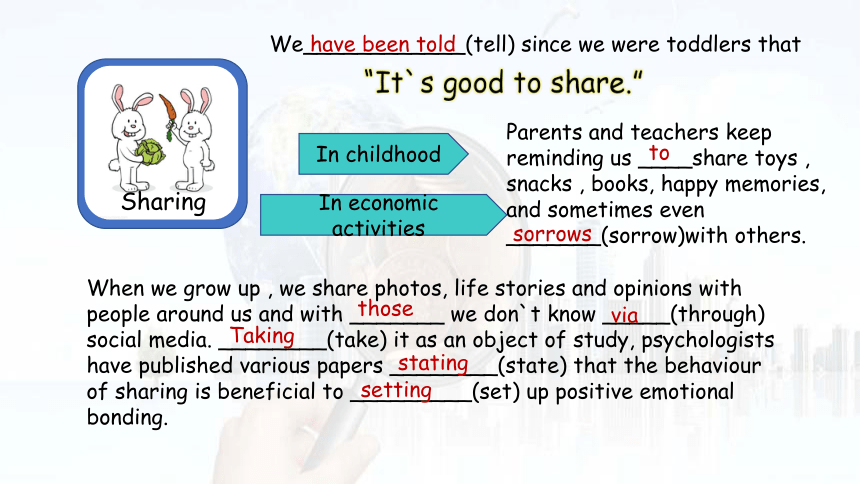
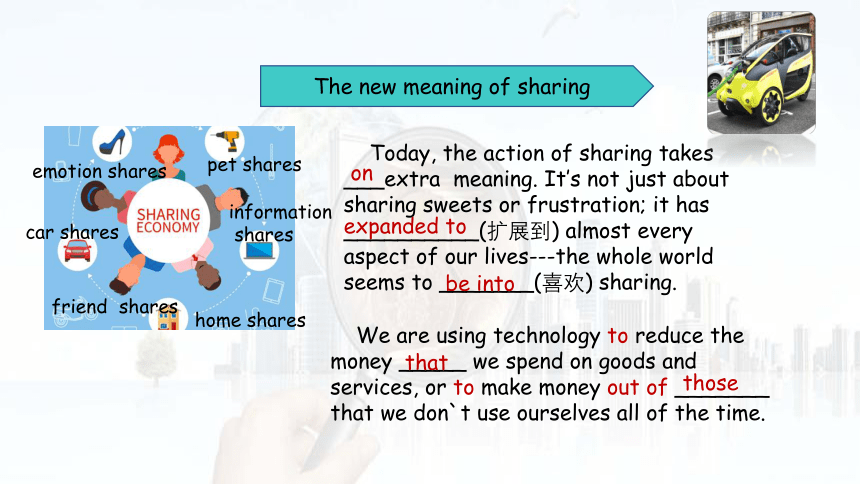
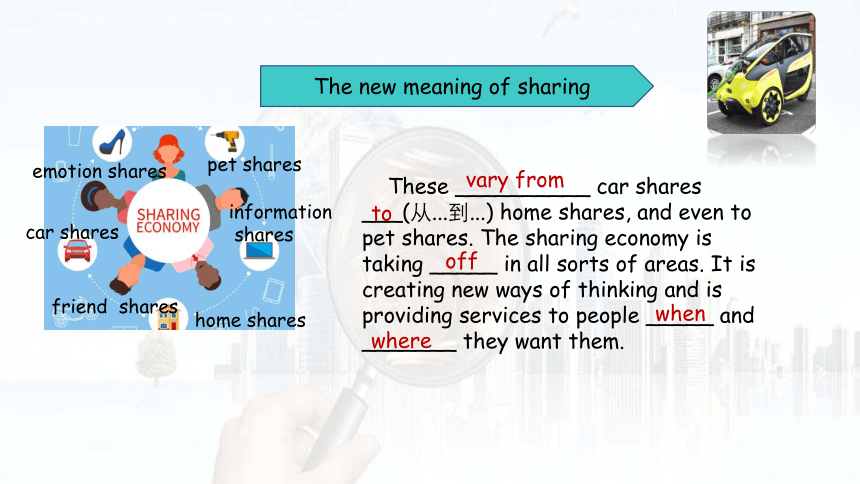
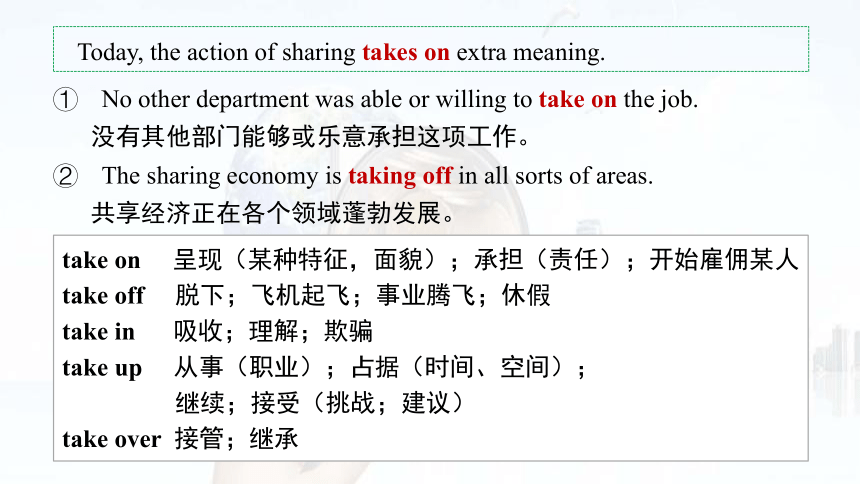
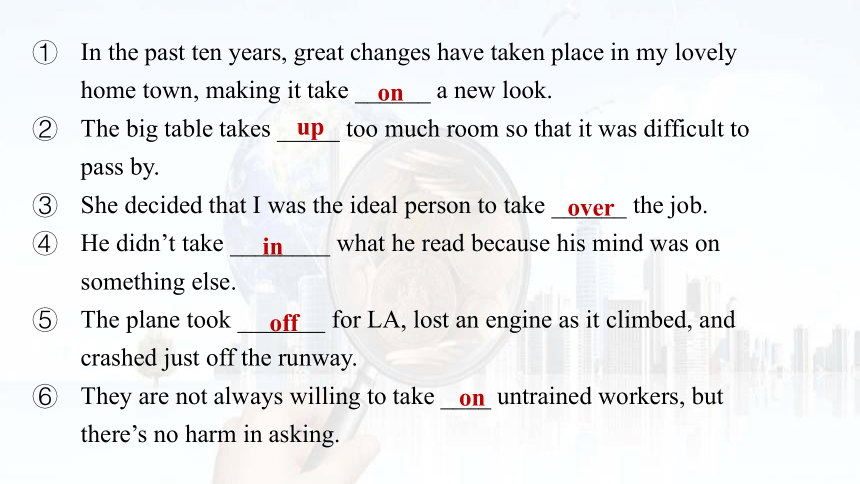
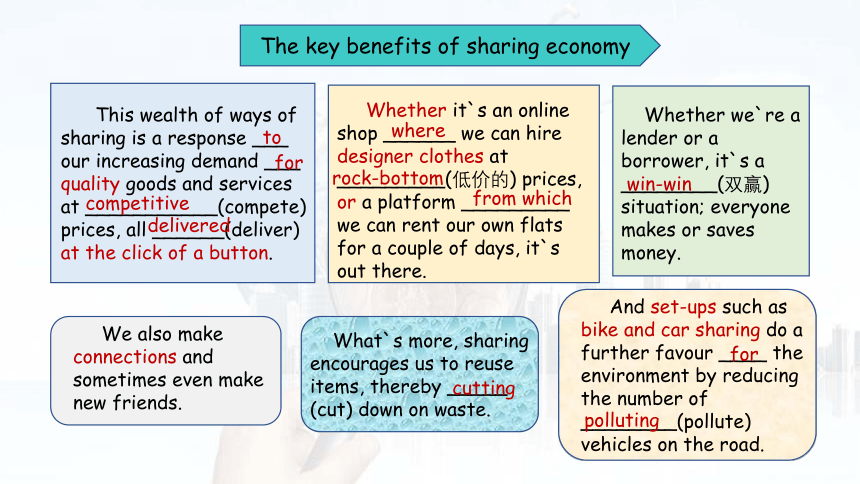
文档简介
(共31张PPT)
Developing ideas
a shared bike
a shared car
Have you ever tried any of them in such a society with sharing economy blooming
What do you think of this experience
1 The author lists the sharing behaviors that we grow up with in paragraph 1 in order to _________.
A tell us the history of sharing.
B remind us of the importance of sharing.
C lead to the topic of sharing economy.
D tell us sharing is common.
2 What does paragraph2 mainly tell us
A What sharing economy is .
B The development of sharing economy.
C The advantages of sharing economy.
D The drawbacks of sharing economy.
Reading comprehension
3 According to the third paragraph, we can infer__________.
A sharing economy prevents us from communicating face to face.
B sharing economy is environmentally friendly in some way.
C sharing economy is increasing waste
D sharing economy has many disadvantages
4 Which of the following is not the drawbacks of sharing economy
A Existing regulations or ongoing supervision can`t keep pace with the development of sharing economy.
B It is subject to abuse of trust.
C Personal data is not yet secure.
D We can hire designer clothes at rock-bottom prices.
5 What`s the author`s attitude towards sharing economy
A Hopeful B Negative. C Untrusted . D Indifferent.
6 existing regulations or ongoing supervision
Think about the structure of the passage and complete the diagram.
abuse of trust
quality goods and services at competitive prices
make connections
make new friends
encouraging people to reuse items
reducing pollution
existing regulations or
ongoing supervision
almost every part of our lives
not yet secure
When we grow up , we share photos, life stories and opinions with people around us and with _______ we don`t know _____(through) social media. ________(take) it as an object of study, psychologists have published various papers ________(state) that the behaviour of sharing is beneficial to _________(set) up positive emotional bonding.
Sharing
“It`s good to share.”
In childhood
In economic activities
Parents and teachers keep reminding us ____share toys , snacks , books, happy memories, and sometimes even _______(sorrow)with others.
We____________(tell) since we were toddlers that
have been told
to
sorrows
those
via
Taking
stating
setting
The new meaning of sharing
Today, the action of sharing takes ___extra meaning. It’s not just about sharing sweets or frustration; it has __________(扩展到) almost every aspect of our lives---the whole world seems to _______(喜欢) sharing.
We are using technology to reduce the money _____ we spend on goods and services, or to make money out of _______ that we don`t use ourselves all of the time.
home shares
car shares
pet shares
emotion shares
friend shares
information
shares
on
expanded to
be into
that
those
The new meaning of sharing
home shares
car shares
pet shares
emotion shares
friend shares
information
shares
These __________ car shares ___(从...到...) home shares, and even to pet shares. The sharing economy is taking _____ in all sorts of areas. It is creating new ways of thinking and is providing services to people _____ and _______ they want them.
vary from
to
when
off
where
Today, the action of sharing takes on extra meaning.
No other department was able or willing to take on the job.
没有其他部门能够或乐意承担这项工作。
The sharing economy is taking off in all sorts of areas.
共享经济正在各个领域蓬勃发展。
take on 呈现(某种特征,面貌);承担(责任);开始雇佣某人
take off 脱下;飞机起飞;事业腾飞;休假
take in 吸收;理解;欺骗
take up 从事(职业);占据(时间、空间);
继续;接受(挑战;建议)
take over 接管;继承
In the past ten years, great changes have taken place in my lovely home town, making it take ______ a new look.
The big table takes _____ too much room so that it was difficult to pass by.
She decided that I was the ideal person to take ______ the job.
He didn’t take ________ what he read because his mind was on something else.
The plane took _______ for LA, lost an engine as it climbed, and crashed just off the runway.
They are not always willing to take ____ untrained workers, but there’s no harm in asking.
on
up
over
in
off
on
And set-ups such as bike and car sharing do a further favour ____ the environment by reducing the number of ________(pollute) vehicles on the road.
The key benefits of sharing economy
This wealth of ways of sharing is a response ___ our increasing demand ___ quality goods and services at ___________(compete) prices, all ______(deliver) at the click of a button.
Whether it`s an online shop ______ we can hire designer clothes at _________(低价的) prices, or a platform _________ we can rent our own flats for a couple of days, it`s out there.
We also make connections and sometimes even make new friends.
What`s more, sharing encourages us to reuse items, thereby _____
(cut) down on waste.
Whether we`re a lender or a borrower, it`s a ________(双赢) situation; everyone makes or saves money.
to
for
competitive
delivered
where
rock-bottom
from which
win-win
cutting
for
polluting
Various drawbacks of sharing economy
But the sharing economy is not without its problems. ____ is often the case all over the world with new areas of economic activity, the sharing economy is developing faster than _______(exist) regulations or ongoing __________(supervise).
As
existing
supervision
Some companies are taking unfair advantage___this situation to expand their ______(份额) of the market, often_______________(以...为代价) more traditional and established companies.
of
share
at the expense of
The estate was transformed at great expense.
庄园改建花了一大笔费用。
The payments he gets barely cover his expenses.
他几乎是入不敷出。
expense n.费用;花费
at the expense of 以损害……为代价
at one’s expense 由某人付费
spare no expense 不惜一切代价
I didn’t have enough money to pay the bus _____ that day.
The construction was built at public________.
The wealthy man admitted that he had left the waitress
a large _______.
I expect you have to pay your lawyer a fat ________.
fare: 车、船费,(交通工具)票价;
fee:(付给专业人员,如医生、律师等的)酬金;入
场费;报名费;会费
tip: 小费;赏钱
expense: 支出,费用
fare
fee
tip
expense
Various drawbacks of sharing economy
In addition, the sharing economy ____________(易受...影响) abuse of trust.
Some people have experienced damage ____ their properties whilst __________(出租) their homes, and others have found themselves victims of theft or attack while sharing rides.
Finally, personal data, the heart of the sharing economy , is not yet secure.
is subject to
to
renting out
Various drawbacks of sharing economy
Sharing platforms collect personal infromation about almost every part of our lives, _________(include) our names, locations, bank information, and individual __________(prefer) for goods and services. Yet, the technology to prevent such information from _______(leak) or ____________(steal) still needs improvement, and the awareness of potential risks is low ______ both service providers and users.
including
preferences
leaking
being stolen
among
Nonetheless ,______is in no doubt is ______the sharing economy is increasingly relevant___ our daily lives as well as ___ the global economy.
It is expanding ___ such a rate that we can only imagine what it will comprise in the future.
The future of sharing economy
What will we be sharing next
Who will be sharing and how
What type of society will all this sharing take us to
what
that
to
to
at
Learning to learn
A two-sided argumentative essay investigates a topic by presenting collated information and evaluating evidence from both sides. It should close by wrapping up the argument. It could conclude in favour of the arguments, or simply stay neutral with no particular preference.
What is the author’s attitude towards the sharing economy
Think & Share
The author acknowledges the benefits of the sharing economy, but he also takes concern about the problems of it. The author is also curious about the future of the sharing economy.
Today, the sharing economy is taking off in all sorts of areas. It is creating new ways of thinking and is providing 1__________(serve) for people when and where they want them. It meets people`s 2_______________(increase) demand for quality goods and services3_______ competitive prices, all 4___________(deliver) at the click of a button.
Besides, it allows people to make or save money. It helps people make connections 5______sometimes even make new friends. What`s more, it 6___________(favour) the environment by cutting down on waste.
直击高考
services
increasing
at
delivered
and
favours
However, the sharing economy is not without its problems. As is often the case all over the world with new areas of economic activity, the sharing economy is developing 7________(fast) than existing regulations or ongoing supervision. The sharing economy is subject to abuse of trust. Some people have experienced damage to their properties and others have found 8___________(they) victims of theft or attack while sharing rides. 9___________(final), personal data is not yet secure. The technology to prevent personal information from leaking or being stolen still needs improvement.
Nonetheless, 10__________ is in no doubt is that the sharing economy is increasingly relevant to our daily lives as well as to the global economy.
faster
themselves
Finally
what
Writing an essay about
non-cash payments
Read the posts from an online forum.
Complete the table with the corresponding information.
Definition of non-cash payments
No cash is involved when people are making their payments. People make their payments with cards, mobile phones and other electronic devices.
Benefits
Convenient and fast. Do not need to carry lots of heavy coins or dirty notes. No more worries about losing wallets.
Conclusion
Non-cash payments, or electronic payments, bring us a lot of advantages. However, the disadvantages can’t be ignored. Maybe we could try to use money less often, rather than replacing it with non-cash payments for ever. Meanwhile, we need to think of ways to make non-cash payments better, friendlier and more scientific.
Problems
Not safe enough and may lead to over consumption. Some forms of electronic payments are restricted to the Internet. Potential inconvenience exists if the phone battery dies. Some forms are unfriendly to those who don’t know how to use electronic payments, especially the elderly.
Write an essay about non-cash payments using the information in Activity 6 and the words and the expressions in this section to help you. Do further research if necessary.
Nowadays, non-cash payments are becoming more and more popular across the world, especially in China. It refers to the method of making payments with cards, mobile phones and other electronic devices. New ways of supporting non-cash payments are quickly turning up one after another.
Obviously, there are many benefits of non-cash payments. First, they are so convenient and fast that people could make almost all the payments with a single click on their smartphones. In some shopping centres, they can pay by simply standing in front of a camera and let it recognise their face. Second, non-cash payments are safe and hygienic. They free people from carrying heavy coins and dirty notes, or even a wallet. Therefore, the risk of losing money or the wallet is not a threat any more. What is more, non cash payments eliminate the risk of counterfeit money.
However, as the old saying goes, every coin has two sides, and so does the non-cash payments, even though they don’t require a coin. The problems that accompany non-cash payments should not be ignored. When thinking it further, non-cash payments might not be quite safe as people have assumed, as it is not that hard for hackers to access people’s bank account and steal the money. It is also easier for your personal information to be stolen, which may bring great trouble. Meanwhile, to some degree, non-cash payments encourage over-consumption. They also depend too much on the Internet access or battery capacity – just imagine being at a place with no wi-fi and a flat battery, how can people make payments via their computers or smartphones then Last but not least, non-cash payments aren’t quite friendly with people not knowing how, especially the elderly. It is such a pity to make them feel excluded and left out.
Nonetheless, non-cash payments are increasingly part of our fast-growing modern society. The current trend is for more non-cash payments, and this trend will probably continue in the future. But embracing a new trend doesn’t mean to exclude the “old-fashioned” ways. Perhaps it is more convenient for everyone – young and old, men and women – to have various options, in both cash and non-cash forms, when it comes to making payments, for the better good.
Non –cash payments
Developing ideas
a shared bike
a shared car
Have you ever tried any of them in such a society with sharing economy blooming
What do you think of this experience
1 The author lists the sharing behaviors that we grow up with in paragraph 1 in order to _________.
A tell us the history of sharing.
B remind us of the importance of sharing.
C lead to the topic of sharing economy.
D tell us sharing is common.
2 What does paragraph2 mainly tell us
A What sharing economy is .
B The development of sharing economy.
C The advantages of sharing economy.
D The drawbacks of sharing economy.
Reading comprehension
3 According to the third paragraph, we can infer__________.
A sharing economy prevents us from communicating face to face.
B sharing economy is environmentally friendly in some way.
C sharing economy is increasing waste
D sharing economy has many disadvantages
4 Which of the following is not the drawbacks of sharing economy
A Existing regulations or ongoing supervision can`t keep pace with the development of sharing economy.
B It is subject to abuse of trust.
C Personal data is not yet secure.
D We can hire designer clothes at rock-bottom prices.
5 What`s the author`s attitude towards sharing economy
A Hopeful B Negative. C Untrusted . D Indifferent.
6 existing regulations or ongoing supervision
Think about the structure of the passage and complete the diagram.
abuse of trust
quality goods and services at competitive prices
make connections
make new friends
encouraging people to reuse items
reducing pollution
existing regulations or
ongoing supervision
almost every part of our lives
not yet secure
When we grow up , we share photos, life stories and opinions with people around us and with _______ we don`t know _____(through) social media. ________(take) it as an object of study, psychologists have published various papers ________(state) that the behaviour of sharing is beneficial to _________(set) up positive emotional bonding.
Sharing
“It`s good to share.”
In childhood
In economic activities
Parents and teachers keep reminding us ____share toys , snacks , books, happy memories, and sometimes even _______(sorrow)with others.
We____________(tell) since we were toddlers that
have been told
to
sorrows
those
via
Taking
stating
setting
The new meaning of sharing
Today, the action of sharing takes ___extra meaning. It’s not just about sharing sweets or frustration; it has __________(扩展到) almost every aspect of our lives---the whole world seems to _______(喜欢) sharing.
We are using technology to reduce the money _____ we spend on goods and services, or to make money out of _______ that we don`t use ourselves all of the time.
home shares
car shares
pet shares
emotion shares
friend shares
information
shares
on
expanded to
be into
that
those
The new meaning of sharing
home shares
car shares
pet shares
emotion shares
friend shares
information
shares
These __________ car shares ___(从...到...) home shares, and even to pet shares. The sharing economy is taking _____ in all sorts of areas. It is creating new ways of thinking and is providing services to people _____ and _______ they want them.
vary from
to
when
off
where
Today, the action of sharing takes on extra meaning.
No other department was able or willing to take on the job.
没有其他部门能够或乐意承担这项工作。
The sharing economy is taking off in all sorts of areas.
共享经济正在各个领域蓬勃发展。
take on 呈现(某种特征,面貌);承担(责任);开始雇佣某人
take off 脱下;飞机起飞;事业腾飞;休假
take in 吸收;理解;欺骗
take up 从事(职业);占据(时间、空间);
继续;接受(挑战;建议)
take over 接管;继承
In the past ten years, great changes have taken place in my lovely home town, making it take ______ a new look.
The big table takes _____ too much room so that it was difficult to pass by.
She decided that I was the ideal person to take ______ the job.
He didn’t take ________ what he read because his mind was on something else.
The plane took _______ for LA, lost an engine as it climbed, and crashed just off the runway.
They are not always willing to take ____ untrained workers, but there’s no harm in asking.
on
up
over
in
off
on
And set-ups such as bike and car sharing do a further favour ____ the environment by reducing the number of ________(pollute) vehicles on the road.
The key benefits of sharing economy
This wealth of ways of sharing is a response ___ our increasing demand ___ quality goods and services at ___________(compete) prices, all ______(deliver) at the click of a button.
Whether it`s an online shop ______ we can hire designer clothes at _________(低价的) prices, or a platform _________ we can rent our own flats for a couple of days, it`s out there.
We also make connections and sometimes even make new friends.
What`s more, sharing encourages us to reuse items, thereby _____
(cut) down on waste.
Whether we`re a lender or a borrower, it`s a ________(双赢) situation; everyone makes or saves money.
to
for
competitive
delivered
where
rock-bottom
from which
win-win
cutting
for
polluting
Various drawbacks of sharing economy
But the sharing economy is not without its problems. ____ is often the case all over the world with new areas of economic activity, the sharing economy is developing faster than _______(exist) regulations or ongoing __________(supervise).
As
existing
supervision
Some companies are taking unfair advantage___this situation to expand their ______(份额) of the market, often_______________(以...为代价) more traditional and established companies.
of
share
at the expense of
The estate was transformed at great expense.
庄园改建花了一大笔费用。
The payments he gets barely cover his expenses.
他几乎是入不敷出。
expense n.费用;花费
at the expense of 以损害……为代价
at one’s expense 由某人付费
spare no expense 不惜一切代价
I didn’t have enough money to pay the bus _____ that day.
The construction was built at public________.
The wealthy man admitted that he had left the waitress
a large _______.
I expect you have to pay your lawyer a fat ________.
fare: 车、船费,(交通工具)票价;
fee:(付给专业人员,如医生、律师等的)酬金;入
场费;报名费;会费
tip: 小费;赏钱
expense: 支出,费用
fare
fee
tip
expense
Various drawbacks of sharing economy
In addition, the sharing economy ____________(易受...影响) abuse of trust.
Some people have experienced damage ____ their properties whilst __________(出租) their homes, and others have found themselves victims of theft or attack while sharing rides.
Finally, personal data, the heart of the sharing economy , is not yet secure.
is subject to
to
renting out
Various drawbacks of sharing economy
Sharing platforms collect personal infromation about almost every part of our lives, _________(include) our names, locations, bank information, and individual __________(prefer) for goods and services. Yet, the technology to prevent such information from _______(leak) or ____________(steal) still needs improvement, and the awareness of potential risks is low ______ both service providers and users.
including
preferences
leaking
being stolen
among
Nonetheless ,______is in no doubt is ______the sharing economy is increasingly relevant___ our daily lives as well as ___ the global economy.
It is expanding ___ such a rate that we can only imagine what it will comprise in the future.
The future of sharing economy
What will we be sharing next
Who will be sharing and how
What type of society will all this sharing take us to
what
that
to
to
at
Learning to learn
A two-sided argumentative essay investigates a topic by presenting collated information and evaluating evidence from both sides. It should close by wrapping up the argument. It could conclude in favour of the arguments, or simply stay neutral with no particular preference.
What is the author’s attitude towards the sharing economy
Think & Share
The author acknowledges the benefits of the sharing economy, but he also takes concern about the problems of it. The author is also curious about the future of the sharing economy.
Today, the sharing economy is taking off in all sorts of areas. It is creating new ways of thinking and is providing 1__________(serve) for people when and where they want them. It meets people`s 2_______________(increase) demand for quality goods and services3_______ competitive prices, all 4___________(deliver) at the click of a button.
Besides, it allows people to make or save money. It helps people make connections 5______sometimes even make new friends. What`s more, it 6___________(favour) the environment by cutting down on waste.
直击高考
services
increasing
at
delivered
and
favours
However, the sharing economy is not without its problems. As is often the case all over the world with new areas of economic activity, the sharing economy is developing 7________(fast) than existing regulations or ongoing supervision. The sharing economy is subject to abuse of trust. Some people have experienced damage to their properties and others have found 8___________(they) victims of theft or attack while sharing rides. 9___________(final), personal data is not yet secure. The technology to prevent personal information from leaking or being stolen still needs improvement.
Nonetheless, 10__________ is in no doubt is that the sharing economy is increasingly relevant to our daily lives as well as to the global economy.
faster
themselves
Finally
what
Writing an essay about
non-cash payments
Read the posts from an online forum.
Complete the table with the corresponding information.
Definition of non-cash payments
No cash is involved when people are making their payments. People make their payments with cards, mobile phones and other electronic devices.
Benefits
Convenient and fast. Do not need to carry lots of heavy coins or dirty notes. No more worries about losing wallets.
Conclusion
Non-cash payments, or electronic payments, bring us a lot of advantages. However, the disadvantages can’t be ignored. Maybe we could try to use money less often, rather than replacing it with non-cash payments for ever. Meanwhile, we need to think of ways to make non-cash payments better, friendlier and more scientific.
Problems
Not safe enough and may lead to over consumption. Some forms of electronic payments are restricted to the Internet. Potential inconvenience exists if the phone battery dies. Some forms are unfriendly to those who don’t know how to use electronic payments, especially the elderly.
Write an essay about non-cash payments using the information in Activity 6 and the words and the expressions in this section to help you. Do further research if necessary.
Nowadays, non-cash payments are becoming more and more popular across the world, especially in China. It refers to the method of making payments with cards, mobile phones and other electronic devices. New ways of supporting non-cash payments are quickly turning up one after another.
Obviously, there are many benefits of non-cash payments. First, they are so convenient and fast that people could make almost all the payments with a single click on their smartphones. In some shopping centres, they can pay by simply standing in front of a camera and let it recognise their face. Second, non-cash payments are safe and hygienic. They free people from carrying heavy coins and dirty notes, or even a wallet. Therefore, the risk of losing money or the wallet is not a threat any more. What is more, non cash payments eliminate the risk of counterfeit money.
However, as the old saying goes, every coin has two sides, and so does the non-cash payments, even though they don’t require a coin. The problems that accompany non-cash payments should not be ignored. When thinking it further, non-cash payments might not be quite safe as people have assumed, as it is not that hard for hackers to access people’s bank account and steal the money. It is also easier for your personal information to be stolen, which may bring great trouble. Meanwhile, to some degree, non-cash payments encourage over-consumption. They also depend too much on the Internet access or battery capacity – just imagine being at a place with no wi-fi and a flat battery, how can people make payments via their computers or smartphones then Last but not least, non-cash payments aren’t quite friendly with people not knowing how, especially the elderly. It is such a pity to make them feel excluded and left out.
Nonetheless, non-cash payments are increasingly part of our fast-growing modern society. The current trend is for more non-cash payments, and this trend will probably continue in the future. But embracing a new trend doesn’t mean to exclude the “old-fashioned” ways. Perhaps it is more convenient for everyone – young and old, men and women – to have various options, in both cash and non-cash forms, when it comes to making payments, for the better good.
Non –cash payments
